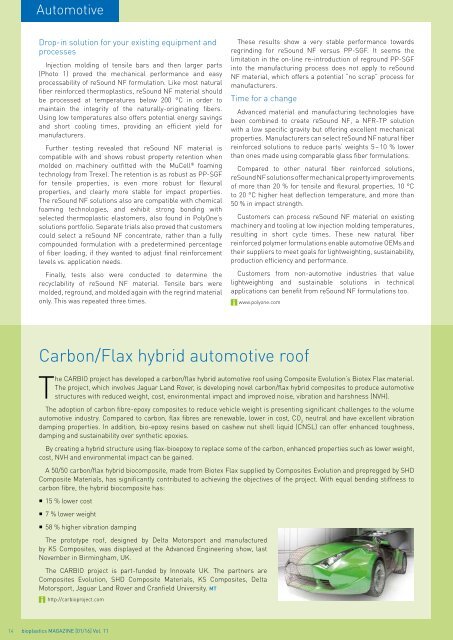Issue 01/2016
Automotive Foam Basics: Public Procurement
Automotive
Foam
Basics: Public Procurement
You also want an ePaper? Increase the reach of your titles
YUMPU automatically turns print PDFs into web optimized ePapers that Google loves.
Automotive<br />
Drop-in solution for your existing equipment and<br />
processes<br />
Injection molding of tensile bars and then larger parts<br />
(Photo 1) proved the mechanical performance and easy<br />
processability of reSound NF formulation. Like most natural<br />
fiber reinforced thermoplastics, reSound NF material should<br />
be processed at temperatures below 200 °C in order to<br />
maintain the integrity of the naturally-originating fibers.<br />
Using low temperatures also offers potential energy savings<br />
and short cooling times, providing an efficient yield for<br />
manufacturers.<br />
Further testing revealed that reSound NF material is<br />
compatible with and shows robust property retention when<br />
molded on machinery outfitted with the MuCell ® foaming<br />
technology from Trexel. The retention is as robust as PP‐SGF<br />
for tensile properties, is even more robust for flexural<br />
properties, and clearly more stable for impact properties.<br />
The reSound NF solutions also are compatible with chemical<br />
foaming technologies, and exhibit strong bonding with<br />
selected thermoplastic elastomers, also found in PolyOne’s<br />
solutions portfolio. Separate trials also proved that customers<br />
could select a reSound NF concentrate, rather than a fully<br />
compounded formulation with a predetermined percentage<br />
of fiber loading, if they wanted to adjust final reinforcement<br />
levels vs. application needs.<br />
Finally, tests also were conducted to determine the<br />
recyclability of reSound NF material. Tensile bars were<br />
molded, reground, and molded again with the regrind material<br />
only. This was repeated three times.<br />
These results show a very stable performance towards<br />
regrinding for reSound NF versus PP-SGF. It seems the<br />
limitation in the on-line re-introduction of reground PP-SGF<br />
into the manufacturing process does not apply to reSound<br />
NF material, which offers a potential “no scrap” process for<br />
manufacturers.<br />
Time for a change<br />
Advanced material and manufacturing technologies have<br />
been combined to create reSound NF, a NFR-TP solution<br />
with a low specific gravity but offering excellent mechanical<br />
properties. Manufacturers can select reSound NF natural fiber<br />
reinforced solutions to reduce parts’ weights 5 – 10 % lower<br />
than ones made using comparable glass fiber formulations.<br />
Compared to other natural fiber reinforced solutions,<br />
reSound NF solutions offer mechanical property improvements<br />
of more than 20 % for tensile and flexural properties, 10 °C<br />
to 20 °C higher heat deflection temperature, and more than<br />
50 % in impact strength.<br />
Customers can process reSound NF material on existing<br />
machinery and tooling at low injection molding temperatures,<br />
resulting in short cycle times. These new natural fiber<br />
reinforced polymer formulations enable automotive OEMs and<br />
their suppliers to meet goals for lightweighting, sustainability,<br />
production efficiency and performance.<br />
Customers from non-automotive industries that value<br />
lightweighting and sustainable solutions in technical<br />
applications can benefit from reSound NF formulations too.<br />
www.polyone.com<br />
Carbon/Flax hybrid automotive roof<br />
The CARBIO project has developed a carbon/flax hybrid automotive roof using Composite Evolution’s Biotex Flax material.<br />
The project, which involves Jaguar Land Rover, is developing novel carbon/flax hybrid composites to produce automotive<br />
structures with reduced weight, cost, environmental impact and improved noise, vibration and harshness (NVH).<br />
The adoption of carbon fibre-epoxy composites to reduce vehicle weight is presenting significant challenges to the volume<br />
automotive industry. Compared to carbon, flax fibres are renewable, lower in cost, CO 2<br />
neutral and have excellent vibration<br />
damping properties. In addition, bio-epoxy resins based on cashew nut shell liquid (CNSL) can offer enhanced toughness,<br />
damping and sustainability over synthetic epoxies.<br />
By creating a hybrid structure using flax-bioepoxy to replace some of the carbon, enhanced properties such as lower weight,<br />
cost, NVH and environmental impact can be gained.<br />
A 50/50 carbon/flax hybrid biocomposite, made from Biotex Flax supplied by Composites Evolution and prepregged by SHD<br />
Composite Materials, has significantly contributed to achieving the objectives of the project. With equal bending stiffness to<br />
carbon fibre, the hybrid biocomposite has:<br />
• 15 % lower cost<br />
• 7 % lower weight<br />
• 58 % higher vibration damping<br />
The prototype roof, designed by Delta Motorsport and manufactured<br />
by KS Composites, was displayed at the Advanced Engineering show, last<br />
November in Birmingham, UK.<br />
The CARBIO project is part-funded by Innovate UK. The partners are<br />
Composites Evolution, SHD Composite Materials, KS Composites, Delta<br />
Motorsport, Jaguar Land Rover and Cranfield University. MT<br />
http://carbioproject.com<br />
14 bioplastics MAGAZINE [<strong>01</strong>/16] Vol. 11


















